After a three-month break, the grayling fishing season opened on the 16th of June. and it was great to start fishing for grayling on the Welsh Dee again.
So, how did I get on…
Fly fishing for Grayling in June
22nd June – Llangollen
It was a hot (24oC) sunny day, so I went fishing for grayling at Llangollen at 4 pm when it started to cool. I selected to fish the Lingo Pool because it’s in the shade, and the fast water at the head is a good fishing spot when the Welsh Dee is at its summer level (0.42m Manley Hall gauge).
Initially, I fished the fast water at the head of the pool with a team of wet flies spaced 3ft apart on a 3 lbs copolymer leader (point: #14 black hopper, middle dropper: #14 March Brown spider, top dropper: #14 Iron Blue Dun).
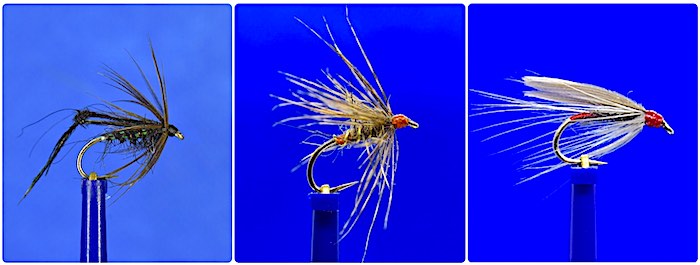
After catching a few trout parr on the Iron Blue Dun, I hooked a bigger fish that took off downriver. Eventually, I gained the upper hand and netted the first grayling of the day.
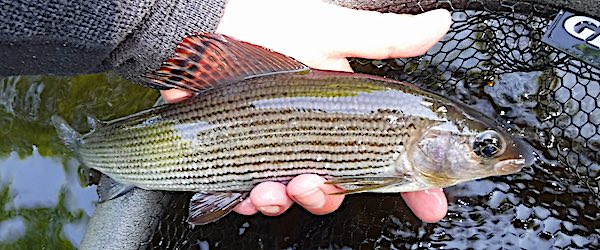
Fishing through the remainder of the Lingo Pool produced two small grayling and trout, followed by a nice grayling that fell for the black hopper.
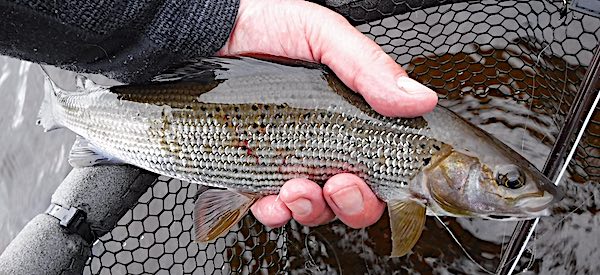
After a fish and chip dinner in Llangollen, I moved upriver to fish the pool above Horseshoe Falls for the final part of the evening.
In the fast water at the top of the pool, I spotted two fish rising as the light faded. So, I switched to fishing a CDC olive dry fly on a 12ft 6X tapered leader. Initially, I caught three small grayling and a brown trout that threw the hook near the net.
Eventually, I hooked a couple of bigger grayling that made it to the net before it was time to head home.
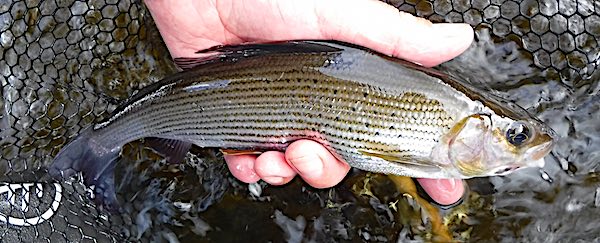
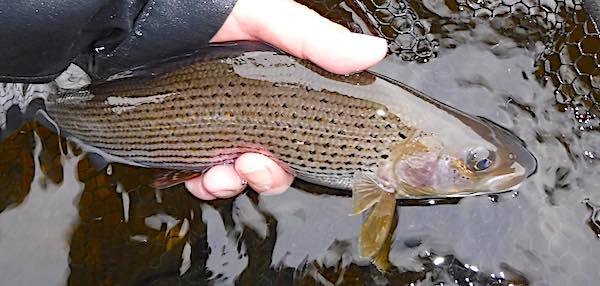
When it got to the falls, a few fish were rising. I started fishing the fast water above my usual spot and caught a couple of small grayling and lost a brown trout.
Fly fishing at Bangor On Dee on 27th June
The persistent dry spell had kept the Welsh Dee at its summer level, and the layer of dead brown algae on the riverbed at Grove Farm was getting worse.
I missed out on the first pool because there was nothing rising. In the tail of the next pool, I spotted two grayling swirling near the surface, but I couldn’t determine what they were taking. So, I decided to target them with a team of wet flies (point: #14 black hopper, middle dropper: #14 pearl-ribbed March Brown spider, top dropper: #18 orange tagged black smutt).
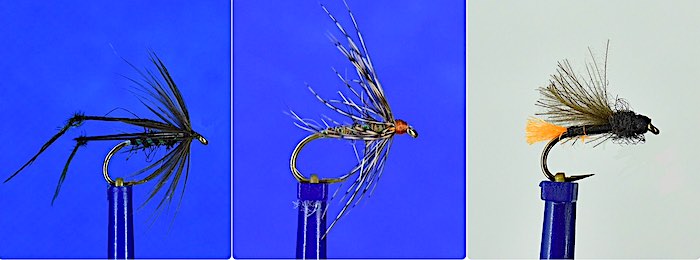
Two grayling were fooled by the black smutt on the top dropper before the remainder were spooked and stopped rising.
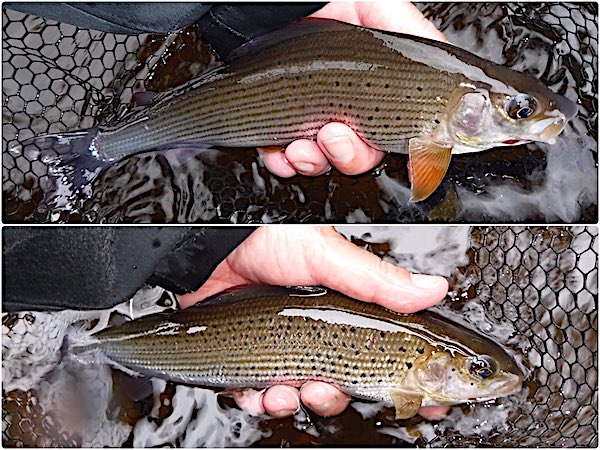
Fishing the fast water directly below the tail produced two more grayling that fell for the black hopper and pearl-ribbed March Brown spider.
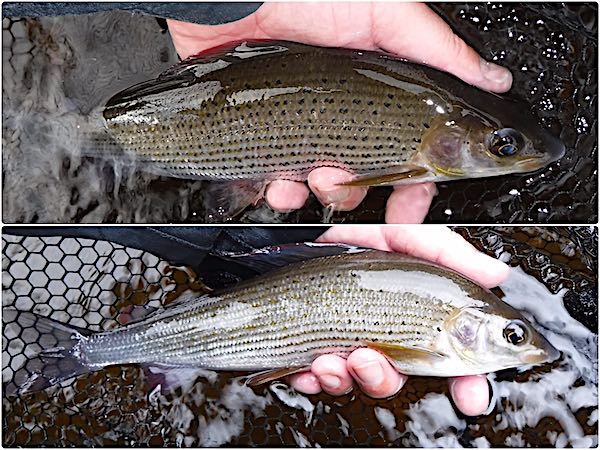
Next, I moved upriver and fished the Cemetry Pool with the wet flies that surprisingly didn’t yield any takes. Fishing the tree-covered glide below was more productive, with a few grayling falling to the March Brown spider.
Fishing for Grayling in July
1st July – Fishing the Bathers Beat near Llangollen
There was little change to the spell of dry, sunny weather as we entered July, and the Welsh Dee was still at its summer level (0.42m Manley Hall gauge).
My mate Graham wanted to explore a section of the Llangolle-Maelor club water he’d not fished. So, I decided to show him where and how to fish the Bathers beat below the Pontcysyllte Aqueduct.
It was a warm day when we parked opposite the Aqueduct Pool. After a quick chat about the plan for the day, we walked down to the Llyn-y-Boat Pool where we couldn’t fish because a group of kids were swimming in the river.
Therefore, we continued downriver and started fishing the riffle leading into the Long Meadow Pool.
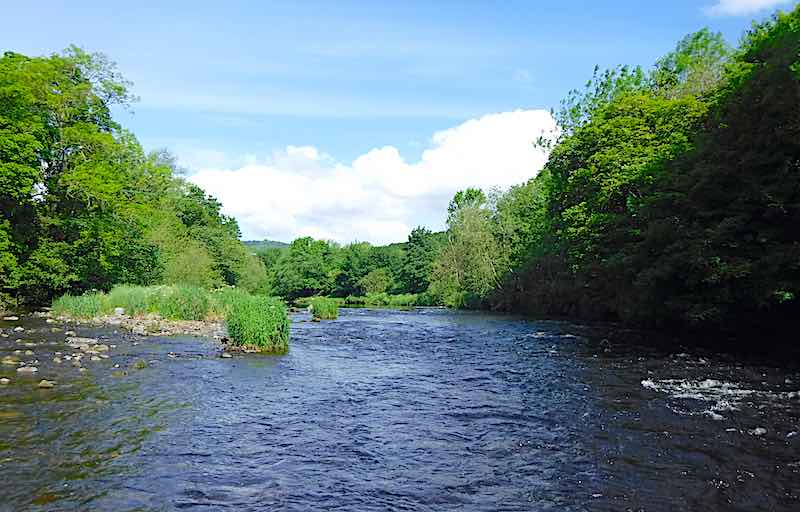
I explained that nymphing was often the best approach to fish the riffle section. So, I set my 11ft 3# Vision Nymphmaniac rod to fish 3 nymphs spaced 18″ apart on a 4lbs fluorocarbon leader (point: #12 olive tungsten jig-back; middle dropper: size 14 black pheasant tail nymph; top dropper: #14 hare’s ear nymph).
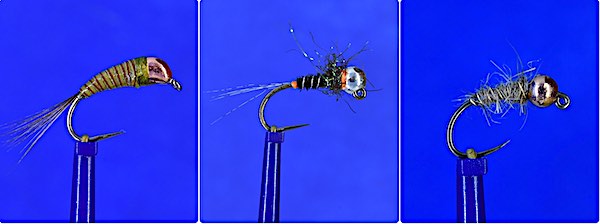
Surprisingly, we only caught a few small grayling and salmon parr on nymphs in the riffle section.
After explaining how to fish the Long Meadows pool, I gave Graham the first shot at fishing it with a team of nymphs. My advice paid off, and it wasn’t long before he’d netted a few nice grayling.
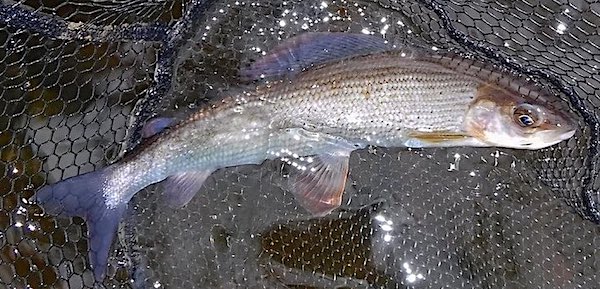
Rather than cover the same ground as Graham, I switched to a team of wet flies/spiders and fished the area close to the far bank (point: #14 black hopper, middle dropper: #14 March brown spider; top dropper: #14 pearly butt Bloa).
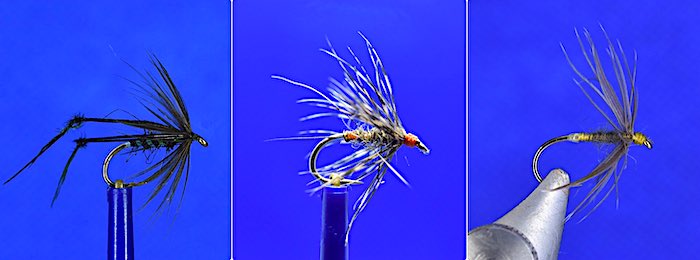
I tempted several grayling on the March Brown spider in the slack water near the far bank. Then, halfway through the pool, I caught a few more grayling on the black hopper.
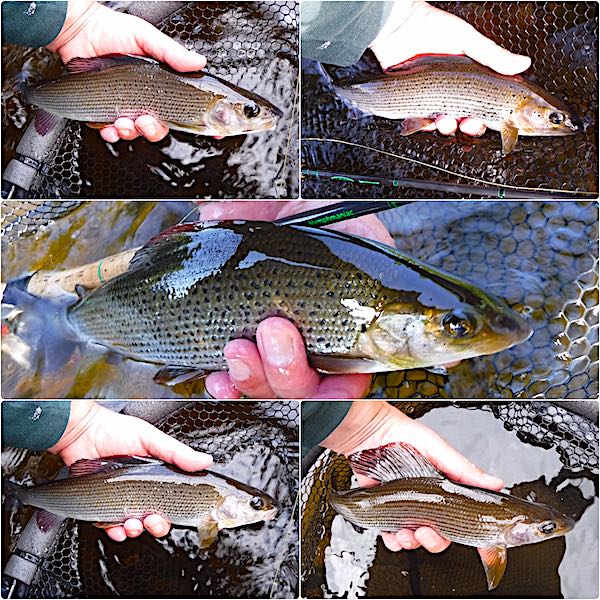
The fishing slowed at 2 pm, so we finished early and headed home.
11th July – Fishing for grayling at Bangor-On-Dee
It had been thundery for a few days, and the downpours had caused a little river to rise slightly to 0.46m (Manley Hall). The break in the weather tempted me to fish the Village Beat at Bangor-On-Dee for a few hours.
As I drove over the bridge into the village, surprisingly, the river was coloured, probably resulting from a local thunderstorm. I nearly turned round and went home but decided to fish Dukes Pool for an hour to avoid a wasted trip.
Fishing a #14 pink squirmy worm above a pink shell back shrimp on a Euro nymphing setup seemed the best approach in the coloured river. Starting in the tail, I fished across and up the pool.
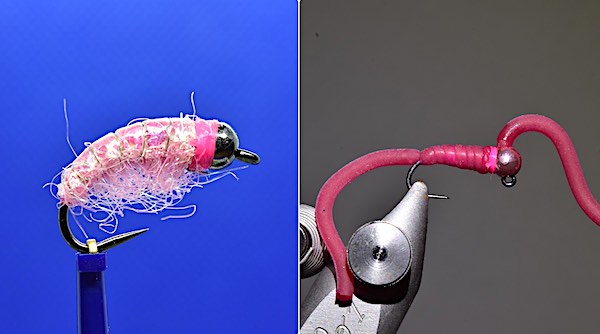
About halfway up the pool, my indicator dipped, and I tightened into a fish that dated into the main flow. Carefully, I gained control and netted a lovely Welsh Dee grayling that had taken the pink squirmy. Another two grayling were caught on the squirmy-worm before the takes dried up.
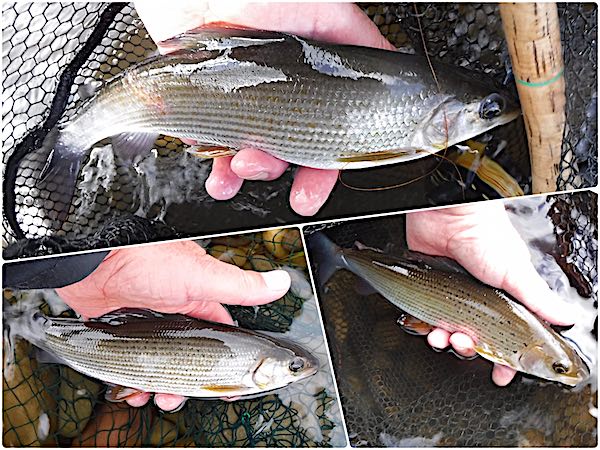
I walked downriver to try my luck fishing Twll Run, which I felt should produce a few grayling. Unfortunately, I didn’t get a single take. So, I called it a day and went home early to catch up on a few jobs in preparation for my next fishing trip.
29th July – Fishing at Bangor-On-Dee
Wet weather arrived on the 14th of July, and all the NW rivers went into spate. So, most of my focus has been on sea trout fishing during the second half of July. However, at the end of July, the river level had dropped to 0.77m (Manley Hall gauge), and I managed to squeeze in a grayling fishing trip to Grove Farm with Graham.
The skies had cleared after early morning rain, and the sun was beaming down onto the river that had a tinge of colour.
We didn’t spot any rising fish or hatching flies on walking up to the first pool. Therefore, I set up to fish a team of three nymphs on a 4lbs fluorocarbon leader (point: #10 purple collar black pheasant tail nymph with a 3.5 mm silver TB; middle dropper: #14 tungsten silver head PTN; top dropper: #16 hares ear nymph with a 2 mm copper TB), and Graham did the same.
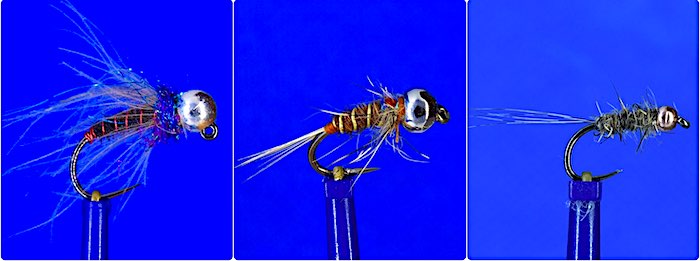
I let Graham have the first shot at fishing the head of the pool, but he didn’t have any takes where the grayling typically hold. Surprised by this, I covered the water a little further out and hooked a fish that took off downriver. After a short struggle, I netted a sea trout that had taken the black PTN on the point. Their presence in the fast water explained the lack of grayling.
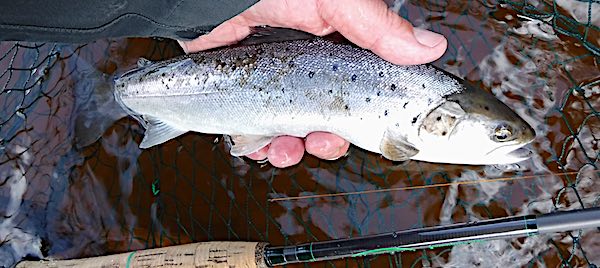
Graham switched to a team of spiders and fished the tail of the pool. The change was successful because he caught a nice grayling on an MBS and lost another as he brought it to the net.
Next, we moved upriver to the Cemetry Pool, which often holds nice grayling. Graham struggled to detect and connect with any takes as he fished the pool because the wind had strengthened. So, he moved up the next pool, and fished it with spiders. While I tried my luck nymphing the Cemetry Pool.
It wasn’t easy, but eventually, I caught a grayling, sea trout, and a small chub that fell for the black PTN on the point.
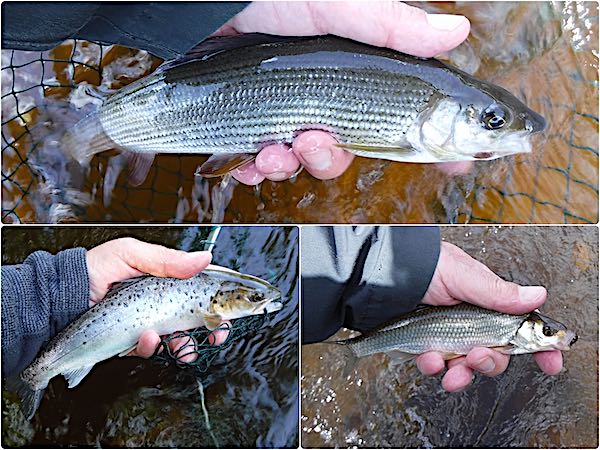
Graham had only caught two small graylings in the pool above.
On the way back to the car, we stopped and fished the pool we’d missed earlier. Graham only caught tiddlers fishing the tree-line run.
I fished the tail of the deep pool above with nymphs, which wasn’t easy because the current was strong. However, I connected with a few takes and landed two grayling and another sea trout.
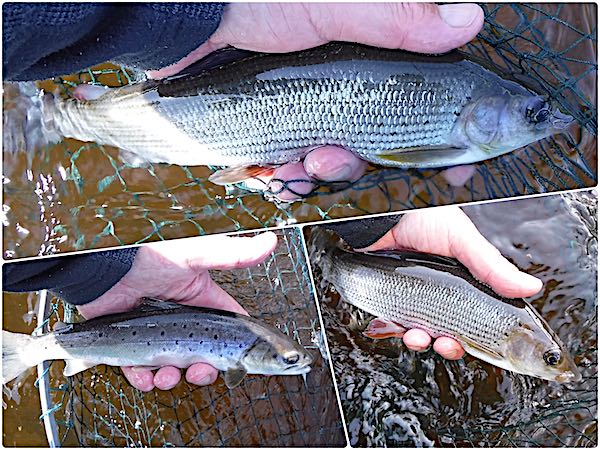
We called it a day when Graham returned from fishing the fast run where he’d two small grayling.
Looking forward to August, it seems the weather will remain wet for the first two weeks. Then dry up towards mid-August, which should improve the grayling fishing on the Welsh Dee as the river returns to its summer level.
Archive – Grayling Fishing in 2023
Fishing for grayling in March on the Welsh Dee
Before the season closed, I managed to squeeze in a grayling fishing trip to Llangollen on the 9th of March. The Welsh Dee had been hovering at its summer level (0.44 m @ Manley Hall) since mid-February.
The cold & clear river conditions made the fishing challenging, but as they say…
Nothing ventured, nothing gained.
And it would be three months before grayling season opens again.
Fishing Duncans Pool
It was a cold (5oC), overcast start to the day in Llangollen, and the lack of rising fish on my walk upriver to Duncans Pool wasn’t surprising.
Therefore, I began fishing a team of three nymphs on a euro-nymphing leader set-up (#12 olive jig back; #14 black PTN silver TB; top dropper: #18 hares ear nymph 1.5mm silver TB).
I didn’t have a take fishing upriver from the tail until I was opposite the first rock ledge. There, my indicator disappeared, and the rod bent double into a big fish that took off downriver.
After a few dicey moments, I gained control and netted…
a lump of a grayling that had taken the olive jig nymph.
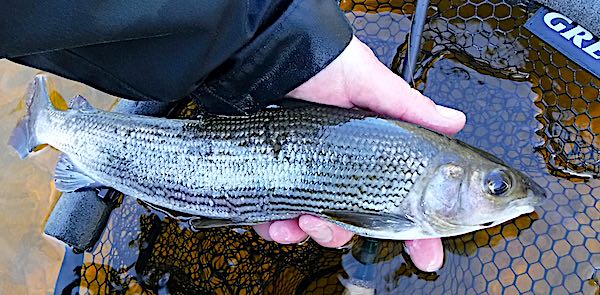
Excited by how the day had started, I methodically fished the rest of the pool. However, the lack of another take dampened my excitement.
So, I moved upriver to fish the Hollybush Pool.
Fishing the Hollybush Pool
Halfway down the Hollybush pool, I saw a fish swirl under the trees on the far bank. I hadn’t seen any flies hatching. So, I set up my other rod (9ft 5#) to fish a wet fly nymph combination (point #12 traditional PTN; middle dropper #14 black hopper, top dropper #14 pearl ribbed March brown spider).
Carefully, I positioned myself below where the fish had swirled and, after two false casts, landed the flies about two feet above the swirl. Moments later, my fly line darted sideways, and I tightened into the fish that dashed for a snag close to the far bank.
Fortunately, I managed to steer it away from the snag and, following a short struggle, netted the second grayling of the day that had taken the black hopper on the middle dropper.
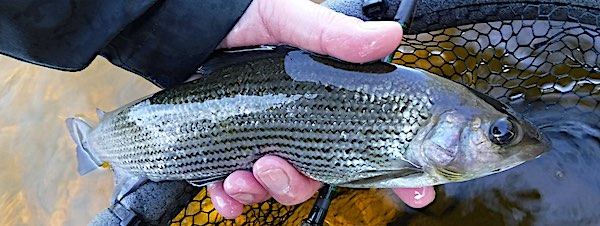
Fishing the rest of the pool with the wet flies produced two small grayling on the March Brown spider and an OOS brown trout on the PTN.
Fishing the Pipe Pool for Grayling
When it started to drizzle at about 2 pm, I walked upriver to finish the day fishing the Pipe Pool.
From the tail on the left bank, I prospected my way upriver with the nymph wet fly set-up because I didn’t spot any rising fish to target.
That approach produced a brace of small grayling that fell for the PTN and a bigger grayling on the black hopper to end the day.
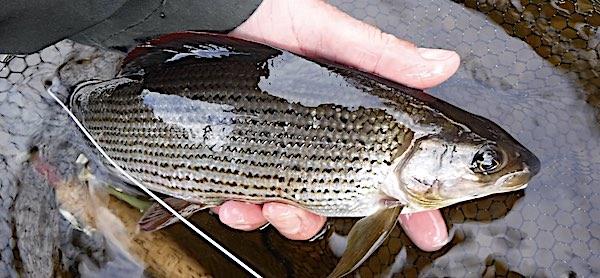
Surprisingly, I managed to wade up through the middle of the pool and get out by the first ledge. Previously that was not possible. It seems the winter floods have moved tons of gravel and changed the structure of the Pipe
Fishing for grayling in February
Dry weather during February and early March helped the fishing for grayling on the Welsh Dee. However, when the snow fell, fishing became almost impossible.
So, let’s look at how I got on when I managed to go grayling fishing…
Grayling fishing at Llangollen 2nd Feb
The river level continued to fall during the extended spell of dry weather. When it reached 0.6m on the Manley Hall gauge) I had a trip to Llangollen to fish the upper beat, which had been unfishable since Christmas.
It was an overcast, gusty (20 mph) day when I pulled into the upper car park. So, I walked upriver to fish the pools sheltered from the wind. I planned to spend most of the day fishing the Top Pool, but I couldn’t resist fishing the Fridge Pool.
Fishing the Fridge Pool
I hadn’t seen any flies hatching. So, I set up my 11ft 3# Vision Nymphmaniac fly rod to fish a team of three nymphs spaced 18” apart on a 4 lb fluorocarbon leader (point: #14 olive tungsten jig back nymph; middle dropper: #14 purple collar black PTN with a 3mm silver TB; top dropper: #16 pheasant tail nymph with a 1.5mm TB).
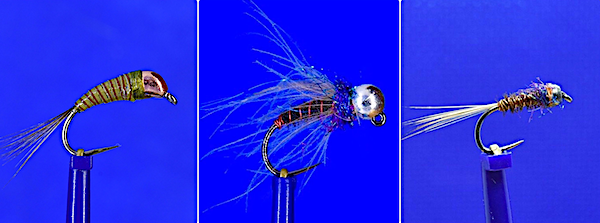
I started fishing the fast water section of the pool and worked upriver to the submerged rock at the head of the pool. About halfway up, I caught a couple of small grayling on the black pheasant tail nymph
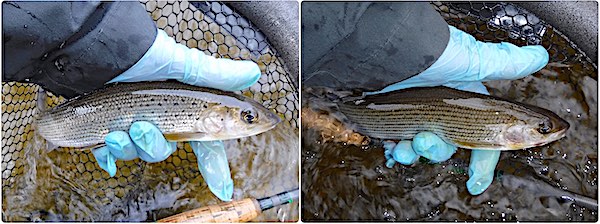
Next, I walked upriver to the Top Pool at the end of the beat.
Fishing the Top Pool
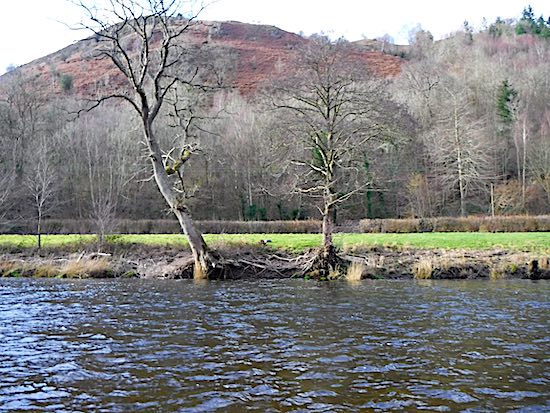
After a refreshment break, I began fishing for grayling in the upper section of the pool with the team of euro-nymphing because I still hadn’t seen any flies hatching.
I’d fished for about 10 minutes before my sighter slid under the surface and the rod bent into a good fish that took off downriver.
Carefully, I gained the upper hand and netted a lovely grayling that had taken the olive jig-back point fly.
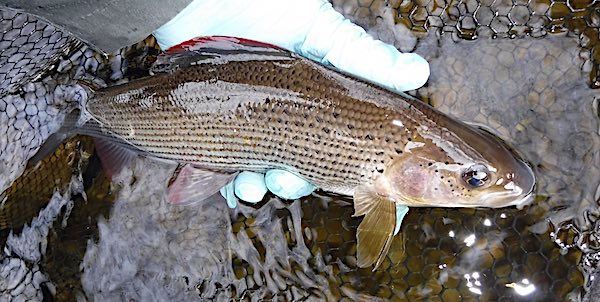
Nymphing upriver produced two smaller grayling before I hooked another nice fish that…
stripped line off the reel as it took off downriver.
A short struggle ensued but it wasn’t long before I netted the first grayling of the day that had taken the black pheasant tail nymph.
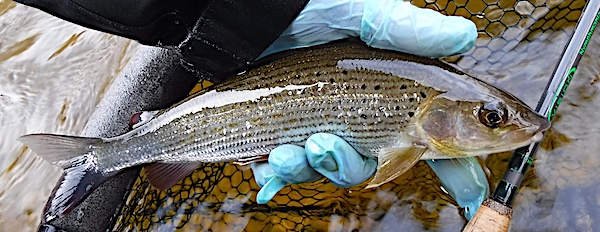
On reaching the head of the pool, I turned around and fished downriver to cover the foam line on the far side of the fast water. After landing two small brown trout, I caught another grayling in the deep water opposite the tree on the far bank.
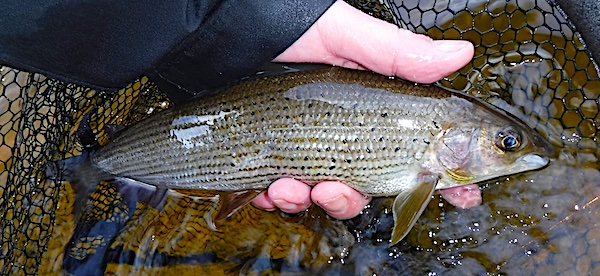
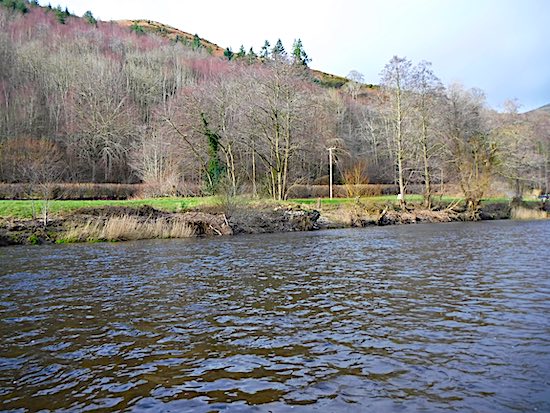
It wasn’t possible to fish the area below the large tree close to the far bank with the nymphs.
So, I switched to fishing a team of wet flies on a long line (point: #14 pheasant tail nymph; middle dropper: #14 black hopper; top dropper: #14 March brown spider).
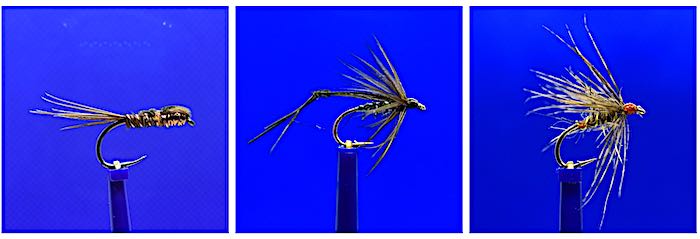
The switch proved successful, and I caught two more grayling and a few OOS brown trout. The grayling fell for the black hopper while PTN fooled the trout.
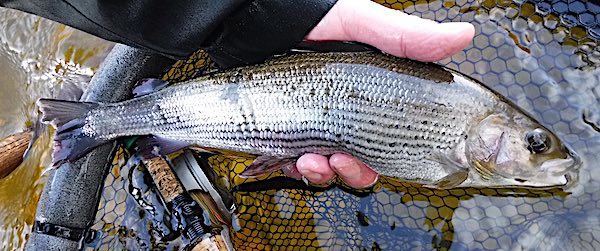
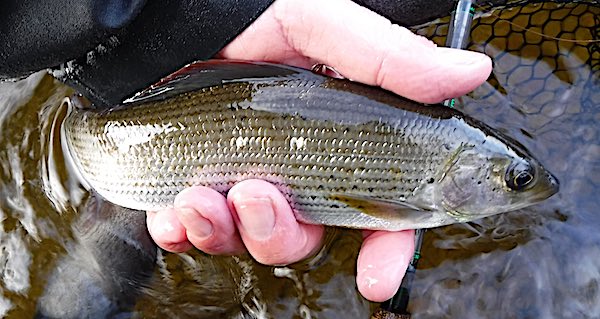
Heavy rain rolled in at about 3 pm. So, I trudged back to the car pleased with my catch seven grayling.
Fishing for Grayling on the Glyndwr Preserve 10th Feb
After another week of cold, dry weather, the Welsh Dee had dropped back to its summer level (0.45m @ Manley Hall gauge). The temperature overnight had dropped below freezing, and I opted for a late morning start because it was forecasted to turn mild (11oC) and windy.
While waiting for the temperature to rise above freezing, I walked down to the bottom of the Glyndwr Preserve but didn’t spot any surface activity. So, I set up my 11ft 3# Vision Nymphmaniac fly rod to fish three nymph spaced 18” apart on a 4 lb fluorocarbon leader (point: #12 olive nymph with a 4mm TB; middle dropper: #14 black PTN with a 3mm purple TB; top dropper: #18 hares ear nymph).
Methodically, I fished my way back to the car but only caught two small graylings on the black PTN. I wasn’t expecting the fishing to be tough and had to change the nymphs several times.
After a break for lunch, I fished the long glide above the car park, hoping for better results.
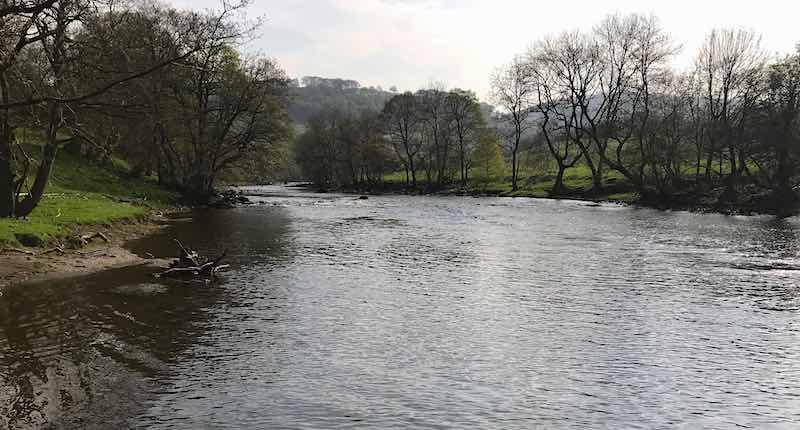
It didn’t start well, nymphing only produced another small grayling. So, I decided to finish the day fishing a nymph, wet flies, and spider combination (point: #14 pheasant tail nymph, middle dropper: #14 black hopper, top dropper: #14 march brown spider).

Starting at the top of the pool, I methodically fished across and downriver with a long line. Halfway down the pool, a fish swirled, my line tightened, and a decent fish stripped line off my reel.
Carefully, I gained the upper hand and guided a lovely grayling to the net. Surprisingly, it had fallen for the pheasant tail nymph on the point.
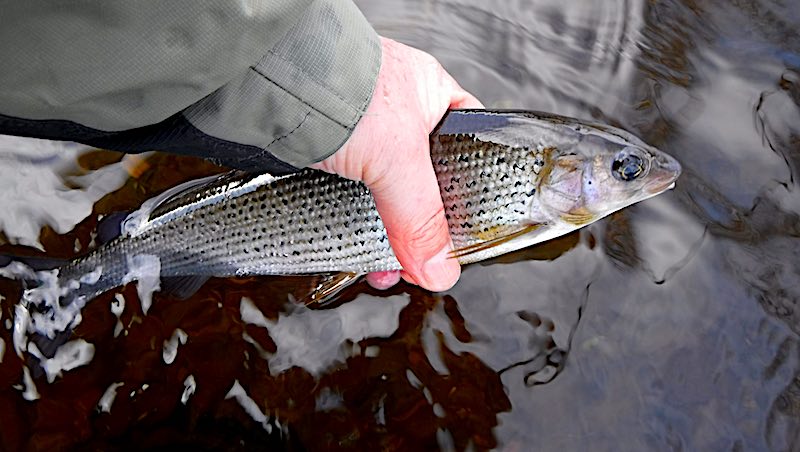
The positive activity was short-lived because I fished the remainder of the pool without another take. At this point, I called time on a tough day and headed home.
Fishing for grayling at Carrog – 25th February
As February drew to a close, the weather turned cold and windy but this didn’t stop me from venturing out to fish the Welsh Dee at Carrog. A place I hadn’t fished before.
The river was at its summer level and running clear, which I prefer when exploring a new beat.
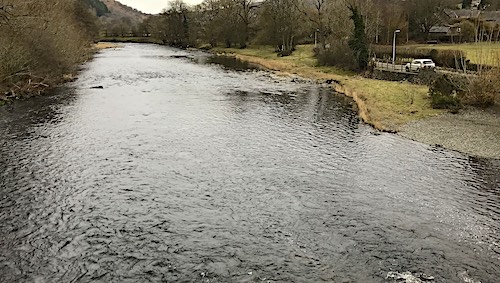
In the absence of surface fly life, I began fishing the pool below the bridge with a team of nymphs (#12 pink collar pheasant tail nymph with 3.5mm black TB; middle dropper #14 hot spot quill nymph with a 3mm silver TB; top dropper: #14 hare’s ear nymph with a 2.5mm gold bead).
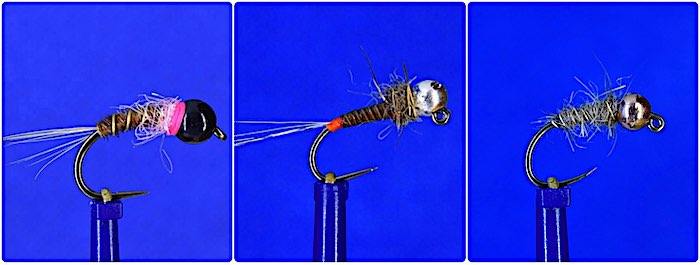
Starting at the tail of the bridge pool, I slowly fished towards the bridge. Going was slow but eventually, my line darted sideways and the fish darted for the fast water. Carefully, I played a beautiful grayling to the net that had fallen for the orange-spot quill nymph.0
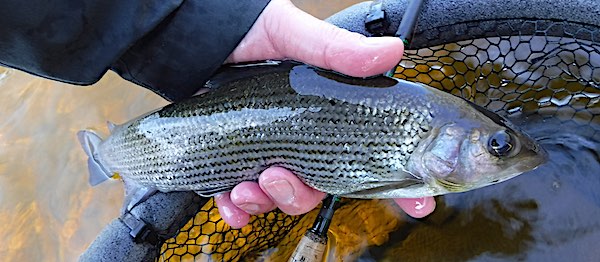
Fishing the remainder of the Bridge pool didn’t produce anything else, so I returned to the car for a cuppa and lunch.
Feeling refreshed, I walked upriver and met a French couple heading downstream who’d not caught anything.
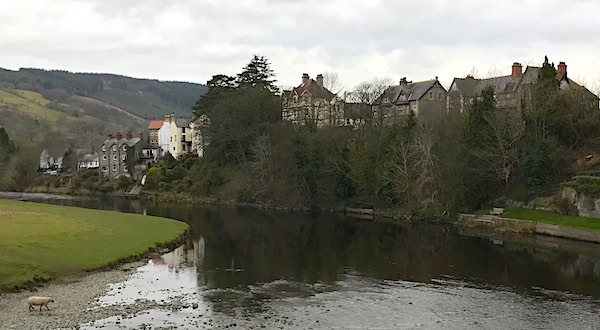
That didn’t bode well, and…
Fishing the pool above the bridge with the nymphs that worked before lunch was unsuccessful.
After noticing a fish surface close to the wall on the far bank, I switched to fishing a North Country Spider/nymph team because it allowed me to cover the far bank (point #12 PTN; middle dropper: #14 black hopper; to dropper: #14 March Brown spider).
The change was a positive move because, after a few casts, a grayling snatched the PTN below a small bush on the far bank.
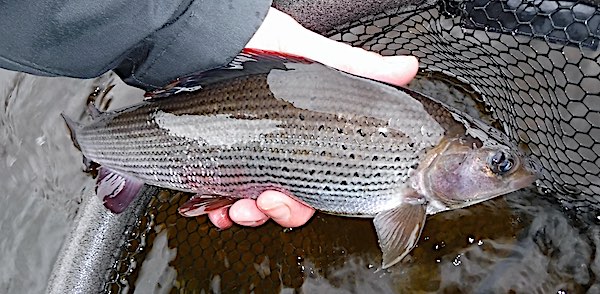
A few casts later, I caught another grayling on the black hopper.
I finished the day on a high…
By adding four more graylings on the nymph wet fly combination.
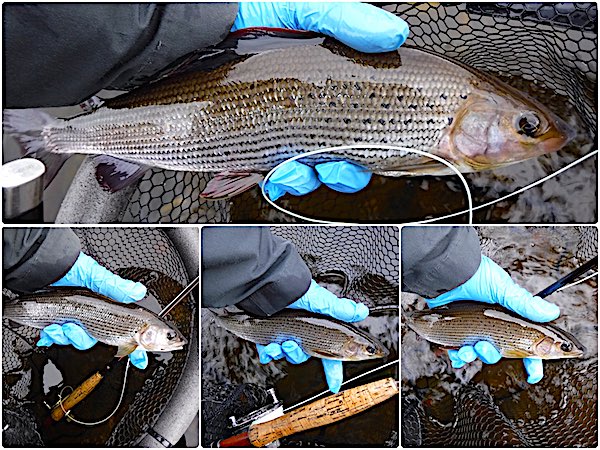
Fishing for grayling in January
At one point, it looked questionable that I would go fishing for grayling on the Welsh Dee in January because the wet and windy weather showed no sign of easing.
Fortunately, the weather dried up, and the river level slowly dropped to a fishable height (1 m @ Manley Hall gauge), and I squeezed in my first grayling fishing trip of the year on the 21st of January to Duncans Pool.
Weather conditions were far from ideal because there had been a sharp overnight frost (-4oC). By 11 am, the temperature began to rise but was barely above freezing when I arrived.
The sun appeared, and it felt slightly warmer, but that didn’t entice any fly life to the surface. Therefore, I set up my Vision Nymphmaniac 11ft 3# rod to fish a team of 3 nymphs (point: #12 pheasant tail nymph with a 4 mm orange TB, middle dropper: #14 peacock quill nymph with a 3mm TB; top dropper: #18 Hare’s Ear nymph with a 1.5 mm copper TB).
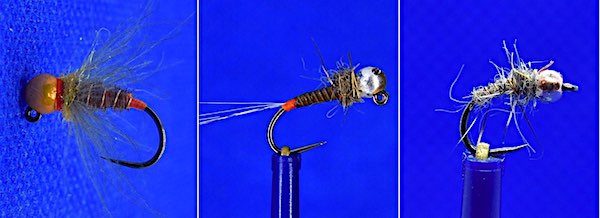
Things were looking bleak after I fished the pool without a take. So, after a hot drink, I switched the middle dropper for a purple-collar black pheasant tail nymph with a 3mm silver TB.
Starting in the fast water at the top of the pool, I methodically fished downriver. Things began to look up when I caught two juvenile graylings on the black PTN.
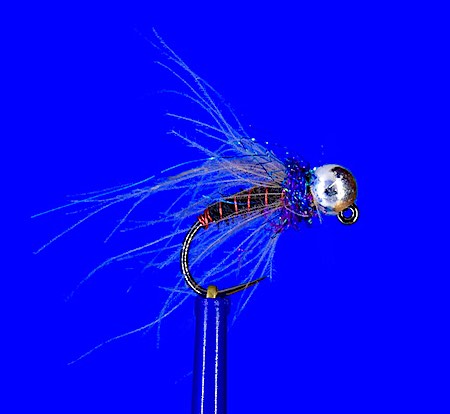
Opposite the rock outcrop, my line darted sideways, and I lifted into a better grayling that had taken the black PTN.
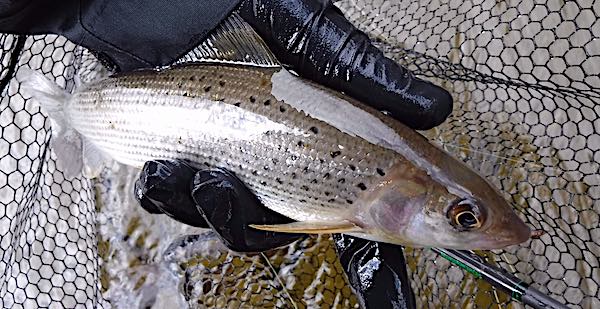
After missing a couple of takes, the black PTN tempted a smaller grayling before the sun disappeared, and everything went dead again. So, we called it a day when the temperature began to fall.
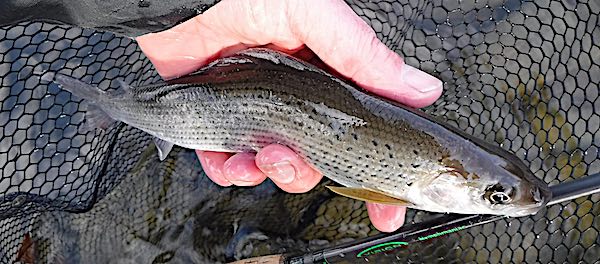
Fishing for grayling above Llangollen – 23/1/23
The weather had warmed slightly since my last trip, but the hills remained coated in snow on their shaded sides. There was a slight rise in the water level (0.78 @ Manley Hall), which I think was due to snow melt, and tallied with the water feeling a few degrees colder.
After parking by the falls, I walked down to fish above Horseshoe Falls with a team of nymphs because no fish were rising (point: #12 olive tungsten jig-back; middle dropper: #14 black PTN with 3.5mm silver TB; top dropper: #16 Hare’s Ear nymph with a 2mm copper TB).
Starting near the bottom of the pool, I zig-zagged my way upriver, searching the riverbed for graylings. However, I only caught two out-of-season brown trout, which took the olive jig-back nymph.
While enjoying a hot brew, I saw a grayling take something at the surface. I didn’t see any flies hatching, so I set a 9ft 5# rod with a floating line to fish a team of wet flies spaced 3ft apart on a 3 lb copolymer leader (point: #14 pheasant tail nymph, middle dropper: #14 black hopper, top dropper: #14 march brown spider).
Carefully, I took up position below where the fish had risen, covering the fish with the wet flies produced an instant response.
BINGO – my rod bent into the first grayling of the day.
That had fallen for the March Brown Spider on the top dropper.
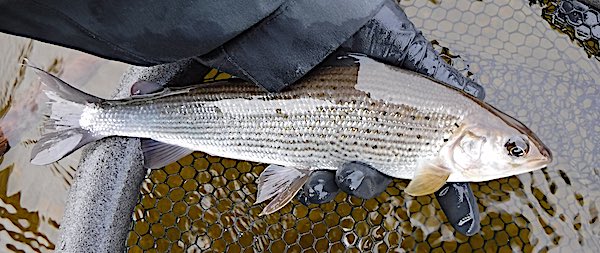
Fishing the rest of the pool produced two more brown trout that fell for the pheasant tail nymph.
After failing to catch anything fishing the tail of Duncans Pool, I wandered upriver to the Pipe Pool at about 2 pm.
Fishing the pool with the wet flies didn’t produce anything. So, reverted to nymphing up through the tail of the pool. This produced two small grayling and one about 30 cm, all of which took the black PTN on the middle dropper
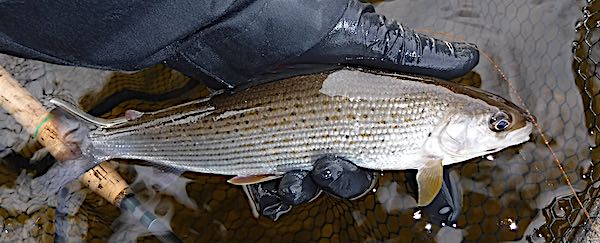
The fishing ground to a halt at about 3 pm, so I called it a day and headed off home to warm up.
Fishing for grayling at Llandderfel – 25/1/23
After two Llangollen fishing trips, I opted for a change of scenery and decided to fish Bala & District Angling Association beat of the Welsh Dee at Llandderfel.
After a lazy start, I pulled into the bridge car park at 10 am. It was a dull but mild day (9oC), and I felt there might be a few flies hatching by midday. In the meantime, I set up to fish a team of nymphs of a 4 lb fluorocarbon leader (point: #12 olive & gold tungsten jig back nymph; #14 black pheasant tail nymph with a 3.5mm silver TB; top dropper: #14 micro pheasant tail nymph).
I walked downriver past the Bridge Pool to fish the tail of the tree-lined long glide. I began by fishing in the shallow water and slowly worked upriver into the deeper water.
As I approached the deep water, I hooked the first grayling of the day that had taken the black PTN on the middle dropper.
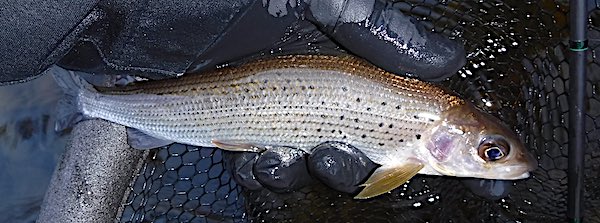
Fishing the remainder of the tail didn’t produce anything else. So, I crossed the river to fish the pool below from the right bank.
The change proved successful because it was long before I hooked a better fish that took off downriver. Carefully, I gained the upper hand and netted beautiful grayling that had taken the olive jig-nymph on the point.
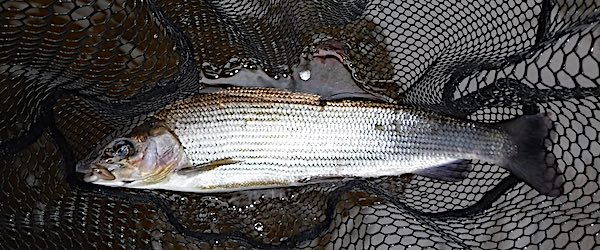
Fishing downriver produced two small graylings on the black PTN. Then, halfway through the pool, the indicator disappeared, and…
a grayling used the current to power off downriver.
Eventually, I got things under control and guided the large grayling to the net that had fallen for the micro pheasant tail nymph on the top dropper.
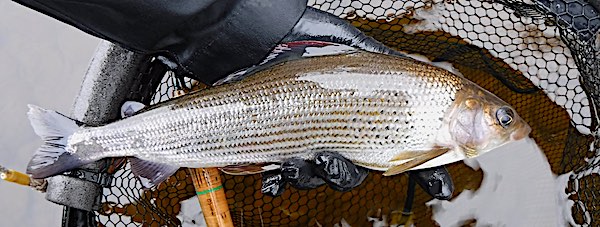
After catching a few smaller grayling in the remainder of the pool, I moved downriver and crossed back to the left bank to the next spot.
In the fast water, I caught three small grayling on the black PTN. Then on the jig nymph, I had a better grayling, which was lying close to the far bank near the drop-off zone.
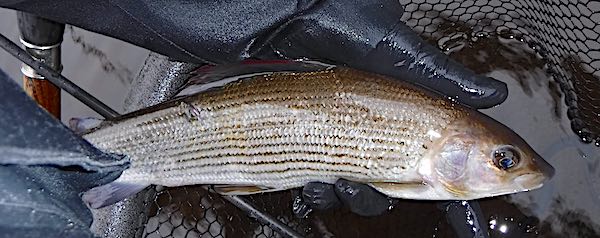
At about 3 pm, takes dried up when the temperature began to fall. Therefore, pleased with how the day turned out, I went home to warm up.
Grayling fishing at Bangor-On-Dee – 28/1/23
I ventured out to fish the Welsh Dee at Grove Farm for my final grayling fishing trip in January. The river level had dropped further and was running clear and steady at 0.68m (Manley Hall gauge).
It was a relatively mild (7°C) day, but I didn’t see any flies hatch or fish rise while walking to the first pool.
Therefore, I set up my 11ft 3# Vision Nymphmaniac fly rod to fish a team of three nymphs spaced 18” apart on a 4 lb fluorocarbon leader(point: #12 olive tungsten jig back nymph; middle dropper: #14 purple collar black PTN with a 3mm silver TB, top dropper: #16 quill nymph).
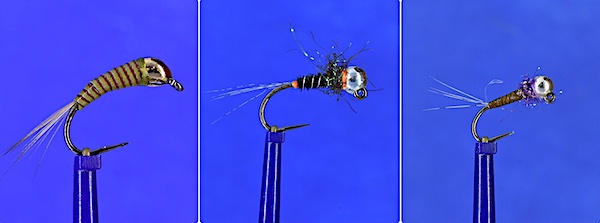
Starting in the middle of the first pool, I slowly fished upriver.
My first take came on approaching the faster water, and following a short struggle, I landed a lovely grayling that had fallen for the black pheasant tail nymph.

Fishing the remainder of the pool produced a much smaller grayling on the same nymph. So, I walked upriver to fish the Cemetery Pool with the euro-nymph set-up.
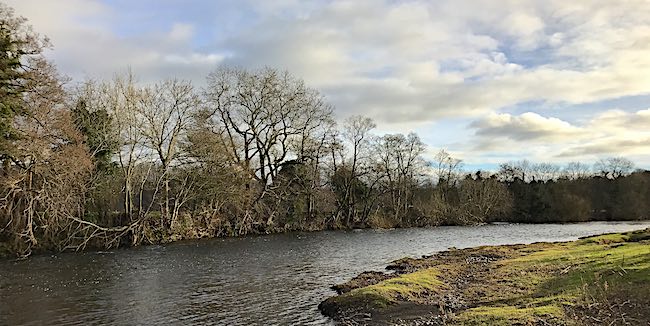
Starting in the body of the pool I methodically fished upriver to the fast water rifle. I’d only made a few casts when my line tightened into another grayling that took the olive jig-back nymph.
Fishing the remainder of the fast water yielded four more grayling, all falling for the black PTN.
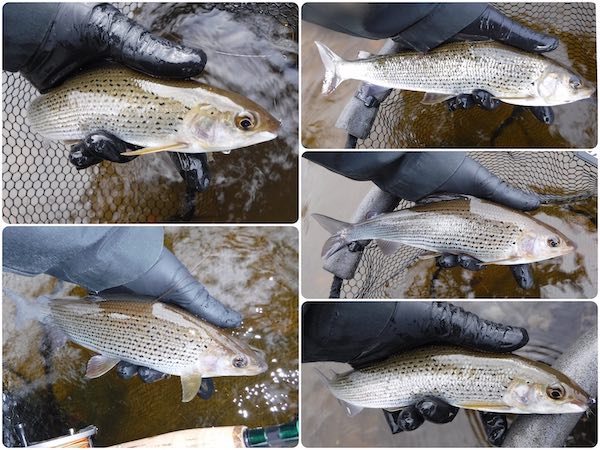
I finished the day nymphing through the tree-lined glide below the Cemetery Pool, where I caught three additional grayling on the black PTN.
January Grayling fishing round-up
Once the Welsh Dee returned to a fishable level in January, I managed to get out fishing and catch some beautiful grayling. At times fishing was tough, particularly on cold days, but perseverance paid off.
With the absence of fly hatches, tight-line nymphing produced almost all the grayling in January. As we move into February, I hope to see some sporadic hatches of large dark olives and spend a few hours fishing for grayling with dry flies.
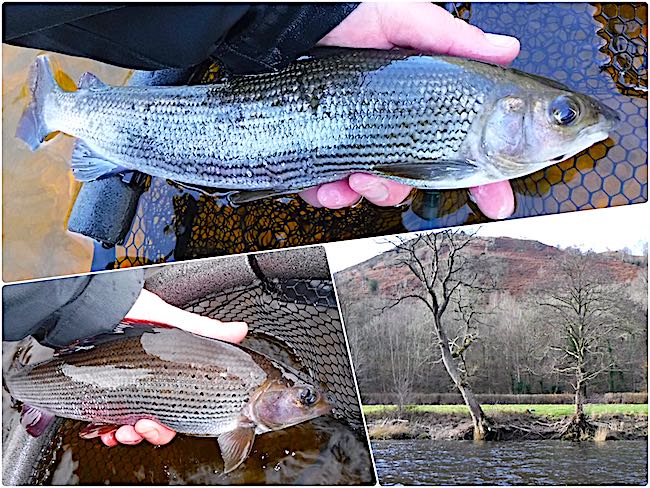
Thanks for another interesting article. I am very much a novice when it comes to fly fishing for grayling, having yet to catch one by the method. Quite a lot to trotting techniques so I know they are there. One of my problems is fishing rivers with a highly industrial past, which are full or detritus both old (brickwork from long collapsed riverside buildings) and new ( tyres and trolleys). So I lose a lot of tackle. One of the things I would like to know is the depths and flow speeds where the grayling tend to assemble at various times of year. Is there much point in fishing fast moving shallow water over gravel? At least there I can see if there is any riverbed rubbish.
Glad to hear you enjoyed the article.
If it’s a dull day you can find grayling lying in relatively fast water a couple of feet deep especially if it is above a deep pool.
I hope this helps, Andrew
Hi Andrew, very useful article once again. How did you get so much time off work to fish the river so many times? My pal George has been fishing the Llangollen area a few times lately with very mixed results. One day great with 15 grayling fished on very heavy TB’s and Java bodies then another day very little using the same method. Yesterday he reckoned the fish were quite high and unfortunately he had not taken his wet fly box – trying to travel light and only taking weighted nymphs. That will teach him. I know you can easily over-do it with tackle and flies but I think its always worth having some wets and spiders in the bag/pocket. I will give you a ring next week prior to our pairs match. Thanks for all the information you give to everyone. It really is useful. Tight Lines, Iain.
Hi Iain,
I was fortunate to be able to retire early so can fish more or less when I want. The Dee fished well in January when the floods subsided but in February the river has been on and off. Somedays they are just not interested in anything and I’ve had to try everything to get a couple of small fish to the net.
Tight lines, Andrew
Very helpful overview as usual Andrew.
Here on the Derbyshire R.Dove the fishing has been quite hard over the past few weeks, although at last the river has fined down and cleared after a lot of chocolate-coloured water discouraged all but the most dedicated (not me!).
I have been out once in these better conditions but didn’t really apply myself properly as it turned out I was sickening with the latest seasonal lurgy and went home after only an hour or so.
But your article is a really useful reminder of your techniques that are sound!
Thanks again.
Hi Charles,
Great to hear you enjoyed it and I hope you have gotten over the lurgy.
Tight lines, Andrew
Cracking piece as always Andrew
Cheers
Thanks for the interesting updates and insights into Graying fishing on the Welsh Dee.
Hi Keith,
Great to hear you enjoyed the post.
Tight lines, Andrew
Another great read Andrew, i have been doing most of my Grayling fishing at the end of the year on the Dove and Wye up on the Derbyshire Dales, but iv been promising my self that I will give the Welsh Dee a crack so maybe this year
Hi Neil,
Give me a shout when you plan to fish the Dee and if I’m available I don’t mind showing you a few good spots.
Tight lines, Andrew